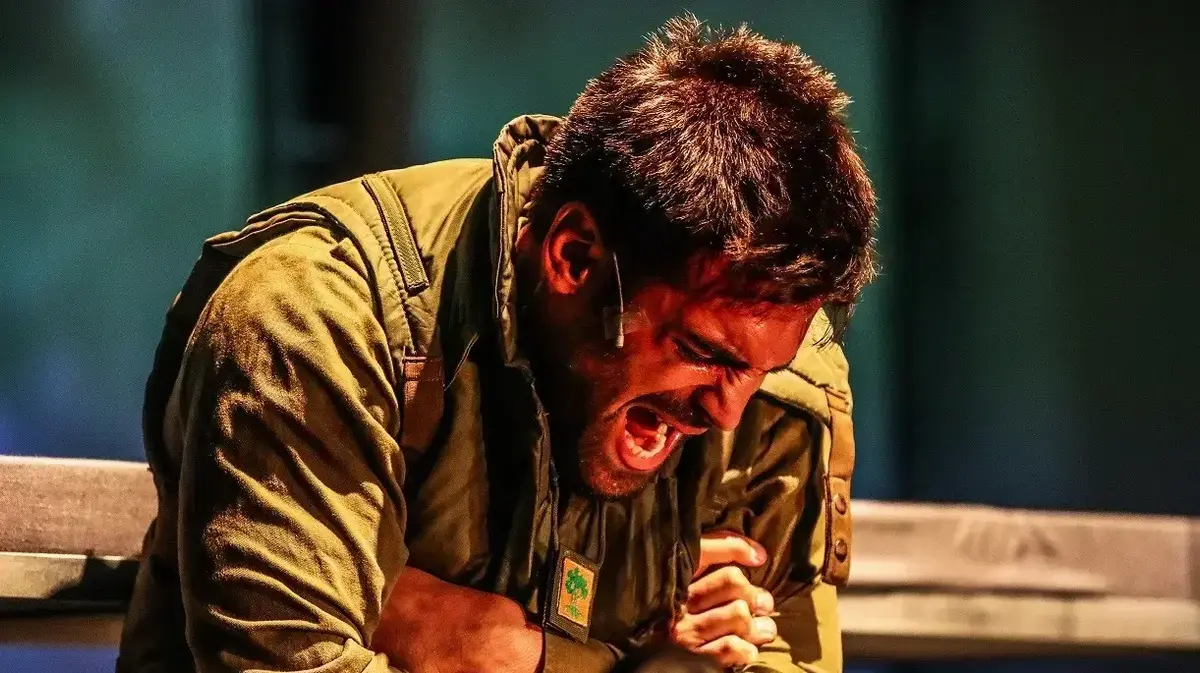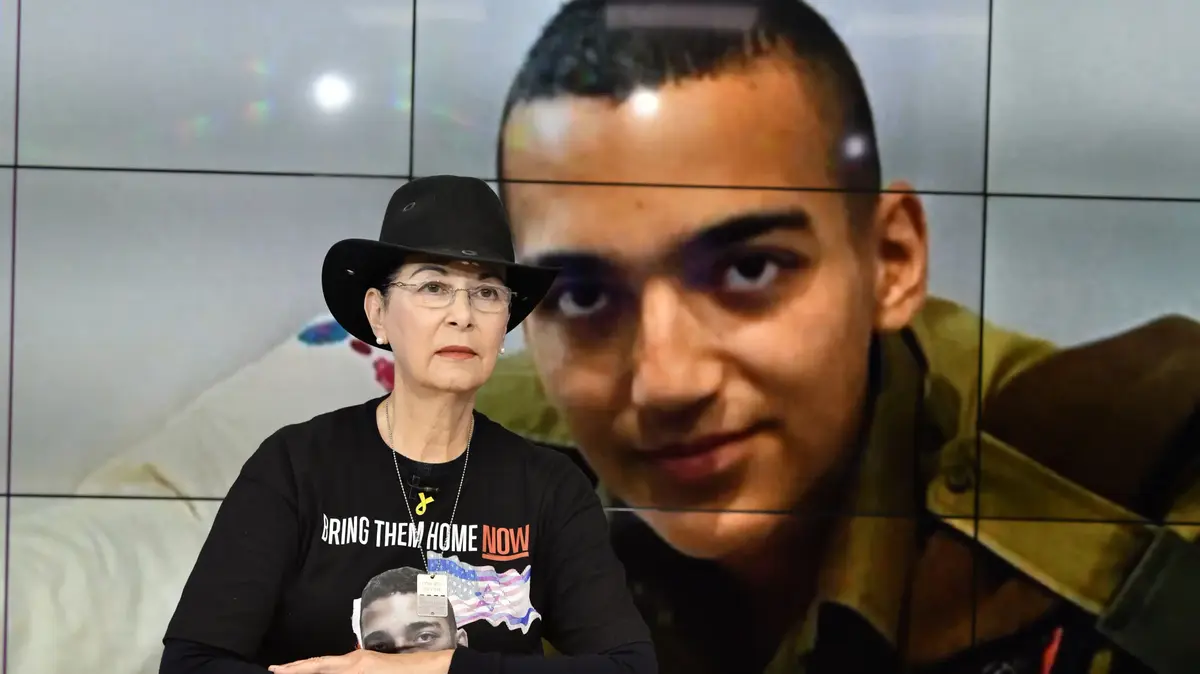culture
in what
Moments after the Saidian affair, "Kaban" is once again flooding the trauma of the soldiers who returned from Gaza
Habima's new show joins a wave of works dealing with battle shock and post-military trauma.
It emerges from an intriguing and insane point of view at the same time and conveys an appealing message - but does not go far enough, and finds it difficult to turn into a truly shaky theatrical event
Tags
Habima
Battle shock
Nadav Menuhin
Tuesday, 17 August 2021, 11:00 Updated: 11:24
Share on Facebook
Share on WhatsApp
Share on general
Share on general
Share on Twitter
Share on Email
0 comments
High on the list of terrifying images seen in Israel in 1959 - a year full of tragedies - can be found the terrible moment when Itzik Saidian, a former fighter in Operation Resilient Cliff, set himself on fire the day before Memorial Day in front of the Rehabilitation Department offices in protest of his treatment. this image flooded at once the scope of post-traumatic stress who struggle with generations of fighters sent to storm and came back half of themselves.
about PTSD and PTSD floated in the public debate largely through culture. that was over a decade ago as a wave of works dealt with as a trilogy of films Lebanon War ("Beaufort", "Waltz with Bashir" and "Lebanon") or the rock opera "War" which was based on the creator's experiences from Operation Defensive Shield, and it seems to have been the same in the last two years, in the discourse around "Lock Hour", in the hit "Unreleased" "Of Avichai Hollander, and other contents. But the Saidian case shook everything as if nothing shook,And most sharply illustrated the all-too-heavy price of living with post-trauma.
Into this climate comes "Kaban", a new play staged by Nevo Ziv and directed by Dafna Zilberg. Wounded in the war?
for further reading
Orna Banai presents: How much has Rabin's assassination changed Israeli society?
This is an ingenious rock mythology.
What fun it is to finally be able to meet her in Israel
"The song returns": Watch a glimpse of the new musical based on the life story of Natan Alterman
Custom insole - half an hour, and you go out into a new life
Loaded show.
Yaakov Daniel and Tomer Makhlouf in "Kaban" (Photo: Or Danon)
At the center of the play is a psychologist (Yaakov Daniel) who was abducted by a former officer (Daniel Sabag), both haunted by the death of a soldier (Tomer Makhlouf) in Gaza a few years earlier. The officer, who was the soldier's commander, now demands explanations from the psychologist who treated him, hints at irregularities and accuses him of death.
Here the mask is slowly deployed. The same psychologist served as an ambitious commander, returning to Israel after years of research at a leading university, directly to a unit stationed on the Gaza Strip border that absorbs soldiers who need mental first aid upon their return from combat. Inspired by his research abroad, "Q one - in a military setting to" fix "the trauma so that it does not become post-trauma.
It is not so simple: the procedures and military bureaucracy, as well as the family of that soldier, oppose it.
The same psychologist insists, argues and convinces everyone that this is the only chance to save him from a life of post-trauma, and returns him to headquarters.
But the soldier falls, and now the question of guilt is discussed - is it the psychologist who insisted on curing him, at the cost of risking his life?
The commander who tried to protect him and put him in the wrong place at the wrong time?
Or, as the commander claims, the same soldier died regardless of everything that preceded it, simply because in the wars of the dead.
More on Walla!
This production turned Romeo and Juliet into a lesbian couple.
We thought it would be a gimmick, but it was pure and beautiful
To the full article
Naturally, the play is charged and touches on painful points - do the military procedures really see the mental needs of the soldiers? Where are the ethical boundaries of the psychologist? And of course: do we do everything possible to prevent unnecessary death. All are weighty and interesting issues, some provocative, but some are addressed in a simplistic way.
The power of the play is especially in the parts where the same psychologist slaps around him appalling sentences, revealing the gap between the militaristic ethos and the reality he is hiding. These sentences undermine the characters' logic, and illustrate the madness of the situation - and also his own madness (the psychologist's unstoppable ego leads him to absurd behavior). Given the chaos of the experience the show is about, Kavan's most obvious goal is to convey an unsettling and confusing message to viewers.
Tomer Makhlouf in the play "Kaban" (Photo: Or Danon)
While the show tackles the battle shock issue well, does it go far enough?
The warrior's trauma is burning, but "Kaban" chooses not to deal, for example, with the consequences of the war on other factors, in the Israeli home front or on the other side of the fence. The goal of the play can be said to be more modest, The collectivity - for example post-national trauma - of a military confrontation
.
Apart from a bit of video art, and some music (with special reference to Ehud Banai's song "Publisher") it does not have many unusual elements beyond the main plot axis, and it relies mainly on the text and acting.
While it is difficult to describe such dramatic issues with restraint, the game's displays in "Kaban" often overflow.
Outstanding in this respect is the character of the bereaved mother (Mickey Peleg-Rothstein), who is actually written more poetically than the rest, including one vision at the end of the play - but convincing and touches much of the rest of the characters.
When she finishes her monologue and the show ends, sadness overflows as well.
Share on Facebook
Share on WhatsApp
Share on general
Share on general
Share on Twitter
Share on Email
0 comments















